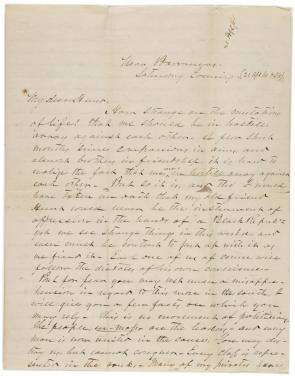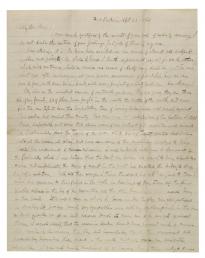Best friends divided by the Civil War, 1861
A Spotlight on a Primary Source by Braxton Bragg and Henry Hunt
 On April 12, 1861, Confederate officials informed Major Robert Anderson, US commander at Fort Sumter in Charleston Harbor, South Carolina, that they would allow one hour for him to surrender his forces. When he refused, Confederates unleashed more than forty cannons on the fort and continued to hold it under fire for a day and a half. The attack on Fort Sumter marked the opening of the Civil War. This terrible conflict would divide families, separate former friends, and open rifts in communities.
On April 12, 1861, Confederate officials informed Major Robert Anderson, US commander at Fort Sumter in Charleston Harbor, South Carolina, that they would allow one hour for him to surrender his forces. When he refused, Confederates unleashed more than forty cannons on the fort and continued to hold it under fire for a day and a half. The attack on Fort Sumter marked the opening of the Civil War. This terrible conflict would divide families, separate former friends, and open rifts in communities.
The following exchange between two old Army friends illustrates the painful choices made by Americans after the surrender of Fort Sumter. At the time, the Confederate general Braxton Bragg was in command in Pensacola, Florida, while Union colonel Henry Hunt was at Fort Pickens, just across the bay. Each was moved to explain their differences and to anticipate the consequences of the impending conflict. Bragg wrote to Hunt, noting the strangeness of their sudden enmity: "A few short months since companions in army, and almost brothers in friendship, it is hard to realize the fact that we are in hostile array against each other." But as a Louisianan, Bragg wanted his Northern friend to appreciate how the "people, en-mass" of the Confederacy were ready for the fight. Henry Hunt, hailing from Michigan, responded with his own conviction that the "unity of our people will be eventually restored" when "the name of American will supersede that of northerner, and southerner."
Excerpt of Bragg to Hunt, April 21, 1861
How strange are the mutations of life! That we should be in hostile array against each other. A few short months since companions in army, and almost brothers in friendship, it is hard to realize the fact that we are in hostile array against each other. But so it is, and tho’ I would have taken an oath that my old friend Hunt could never be the instrument of oppression in the hands of a Black Repub[lica]n yet we see strange things in this world, and even must be content to put up with it as we find it. Each one of us of course will follow the dictates of his own conscience.
Excerpt of Hunt to Bragg, April 23, 1861
We must each as you say act according to the dictates of our consciences. Although you think my course a wrong one you know that I never have felt and I do not feel now hostile to the South, her institutions or her people nor can I have toward  them the feelings of an "alien enemy." I trust and I believe notwithstanding the dark prospects before us, and although blood may flow like water, that the time will yet come – if neither of us fall in the struggle – when we will meet again not merely as friends, which I am sure we will continue to be, but as fellow citizens of a great, prosperous, happy and united country.
them the feelings of an "alien enemy." I trust and I believe notwithstanding the dark prospects before us, and although blood may flow like water, that the time will yet come – if neither of us fall in the struggle – when we will meet again not merely as friends, which I am sure we will continue to be, but as fellow citizens of a great, prosperous, happy and united country.
A full transcript is available for Bragg’s letter to Hunt.
A full transcript is available for Hunt’s response to Bragg.
